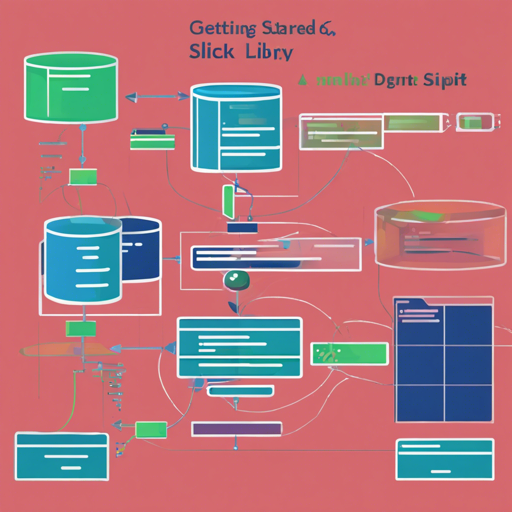Welcome to the world of Slick, an advanced database access library that allows Scala developers to interact with relational databases effortlessly. Think of Slick as a bridge connecting Scala’s expressive code with the structured realm of databases, ensuring you write cleaner, safer, and more efficient database code.
What is Slick?
Slick is designed to make database access feel natural to developers familiar with Scala. You can work with your database similarly to how you would manipulate Scala collections. This library offers:
- Strongly-typed APIs to bring you compile-time safety.
- A rich query API inspired by Scala’s collections API.
- Seamless integration with various databases.
- Asynchronous capabilities using Future and streaming APIs.
Understanding Slick through an Analogy
Imagine you are a chef in a restaurant kitchen. Your recipes (queries) can be simple or complex, and you have a pantry (the database) filled with various ingredients (data) to choose from. With traditional methods, you would have to communicate with the pantry staff (the database) frequently, asking for each ingredient individually. However, Slick acts as a super-efficient assistant who knows the pantry so well that you can give them your entire grocery list (Slick queries), and they will fetch all the ingredients at once without interrupting your cooking process.
Basic Usage Example
Let’s walk through a simple example demonstrating how to define a Scala object representing a coffee and create a table for it in the database using Slick:
import slick.jdbc.PostgresProfile.api._
// Declare the Scala object
final case class Coffee(name: String, price: Double)
// Define the table mapping
class Coffees(tag: Tag) extends Table[Coffee](tag, "COFFEES") {
def name = column[String]("NAME")
def price = column[Double]("PRICE")
def * = (name, price).mapTo[Coffee]
}
// Access the rich query API
val coffees = TableQuery[Coffees]
// Inserting data
coffees += Coffee("Latte", 2.50)
// Fetching data
coffees.map(_.name)
// More complex queries
coffees.filter(_.price < 10.0).sortBy(_.name)
Supported Databases
Slick supports various databases out of the box, ensuring you can use it with confidence. Here are some of the key supported databases:
- PostgreSQL
- MySQL
- SQLServer
- Oracle
- DB2
- DerbyJavaDB
- H2
- SQLite
Troubleshooting
If you encounter any issues while using Slick, here are a few troubleshooting tips:
- Ensure you have the correct JDBC driver for your database.
- Check the database connection settings and make sure your database server is running.
- Look out for typing issues; Slick relies heavily on Scala's type system.
For more insights, updates, or to collaborate on AI development projects, stay connected with fxis.ai.
Resources for Learning More
To deepen your understanding of Slick, check the following resources:
- Full documentation, including Scaladocs, can be found on the official website.
- Essential Slick is available as a free download from our friends at underscore.io.
- Explore videos by Rock the JVM for practical insights.
At fxis.ai, we believe that such advancements are crucial for the future of AI, as they enable more comprehensive and effective solutions. Our team is continually exploring new methodologies to push the envelope in artificial intelligence, ensuring that our clients benefit from the latest technological innovations.

